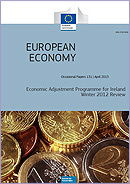|
|
|
|
|
|
 |
 |
 |
 |
Review mission concludes Greek adjustment programme on track, return to growth expected in 2014
Staff teams from the European Commission (EC), European Central Bank (ECB), and International Monetary Fund (IMF) have concluded their review mission to Greece. In a statement issued on 15 April, the mission noted that staff-level agreement had been reached with the Greek authorities on the economic and financial policies needed to ensure that Greece’s adjustment programme remains on track. The mission and the Greek authorities also agreed that Greece’s economic outlook is largely unchanged from the previous review, with continued prospects for a gradual return to growth in 2014. Inflation that is well below the euro area average, and improved wage flexibility, are helping to restore the competitiveness of the Greek economy. Fiscal performance remains on track, and the government is committed to fully implement all agreed fiscal measures for 2013-14. The authorities have made important progress on measures to improve tax and debt collection, and actions to fully recapitalise the banking sector are nearing completion. The Eurogroup and the IMF’s Executive Board are expected to consider approval of the review in May.
|
 |
 |
 |
|
 |
 |
 |
 |
 |
|
 |
 |
 |
| The work of the Troika focuses on assisting Greece in rebalancing and restructuring its economy and in improving medium-term opportunities for employment and growth. Let me stress these words: employment and growth. These are the principal objectives of the economic reform programme of Greece.
|
 |
- Olli Rehn, Commission Vice-President for Economic and Monetary Affairs and the Euro.
|
|
|
|
 |
 |
 |
 |
Ninth review mission highlights Ireland’s strong record of programme compliance
The European Commission has completed its ninth review of the EU-IMF financial assistance programme for Ireland and has published the associated technical report. The report of 22 April highlights Ireland's continued strong record of programme compliance. At 7.6% of GDP, in 2012 the general government deficit was well within the programme ceiling, and the 2013 budget is consistent with the programme deficit ceiling for this year (7.5% of GDP). Other key reforms, such as the broadening of the tax base through the introduction of a Local Property Tax, remain on track. The completion of the review enables a disbursement of EUR 1.6 billion from the European Financial Stability Facility, bringing total available disbursements from the EU, IMF and bilateral partners to EUR 60 billion. This represents close to 90% of the total international assistance of EUR 67.5 billion available under the programme.
|
 |
|
 |
 |
|
 |
 |
 |
 |
Eurogroup and ESM approve Cyprus financial assistance; Rehn underscores importance of banking union
On 24 April, the Board of Governors of the European Stability Mechanism (ESM) formally approved the proposal for a financial assistance facility agreement for Cyprus, subject to completion of national procedures. The first ESM disbursement is scheduled to take place by mid-May. Earlier this month, euro area finance ministers authorised the launch of the relevant national procedures required for the formal approval of financial assistance for Cyprus. The authorisation given on 12 April and approval by the ESM Board of Governors means that up to EUR 9 billion in funds could be contributed from the European Stability Mechanism (ESM), with another EUR 1 billion contributed by the International Monetary Fund (IMF), subject to approval by the IMF Board in early May. Speaking on 17 April before the European Parliament, Commission Vice President Olli Rehn welcomed the agreement by the Eurogroup. He noted that the situation in Cyprus shows that there must be absolute clarity about secured deposits, and demonstrates why a Banking Union – including a well-functioning Single Supervisory Mechanism with a single rulebook – is an essential element of a true Economic and Monetary Union (EMU).
|
 |
|
 |
 |
|
 |
 |
 |
 |
Finance ministers agree to extend EFSM and EFSF loan maturities for Ireland and Portugal
Meeting on 12 April, Eurogroup and ECOFIN ministers agreed to lengthen the maturities of the European Financial Stabilisation Mechanism (EFSM) and European Financial Stability Facility (EFSF) loans to Ireland and Portugal. The weighted average maturity of loans will be increased by 7 years based on successful programme implementation by the two countries as confirmed by the results of the 9th review of the Irish adjustment programme and subject to the 7th review of the Portuguese programme. The measure is expected to increase investor confidence and further accelerate the two countries return to full market financing.
|
 |
|
 |
 |
|
 |
 |
 |
 |
EU and US share experiences at Transatlantic economic conference
EU and US officials shared experiences at the conference on ‘Transatlantic economic interdependence and policy challenges’ which took place on 22 April in New York. The conference was jointly organised by the Federal Reserve Bank of New York and DG ECFIN. The conference, which was held over three sessions, was jointly opened by William Dudley, President of the Federal Reserve Bank of New York, and Ambassador João Vale de Almeida, Head of the EU Delegation to the United States. The first session, which was chaired by Marco Buti, Director General of DG ECFIN, was dedicated to transatlantic macro-financial linkages. The second session explored macroeconomic developments and policy challenges in the United States and Europe’, and the third session dealt with the ‘Transatlantic Dimensions of Financial Reform’. In his keynote speech Vice President Olli Rehn discussed the EU and US experiences in fighting unemployment and promoting growth, as well as the EU experience in promoting growth friendly fiscal consolidation, correcting intra-euro area imbalances and reforming the EU and euro area financial system.
|
 |
|
 |
 |
|
 |
 |
 |
 |
G20 Finance Ministers and Central Bank Governors agree to continue reforms toward stronger and balanced economic growth
European Commission Vice-President Olli Rehn participated in the G20 Finance Ministerial and Central Bank Governors’ meeting held in Washington DC on 18-19 April. Discussions focused on the global economic situation and the actions needed to strengthen the recovery. It was stressed that the Euro area needs to further strengthen Economic and Monetary Union (EMU) by urgently moving towards banking union and by continuing to strengthen banks’ balance sheets. Other issues related to the international financial architecture, financial regulation as well as tax avoidance and evasion were also discussed. Work will continue on developing medium-term fiscal strategies in time for the G20 St. Petersburg Summit in September.
|
 |
|
 |
 |
|
 |
 |
 |
 |
Commission welcomes European Parliament decision to grant discharge of the 2011 EU budget
The European Commission welcomed the decision by the European Parliament on 17 April to discharge the 2011 EU budget. The budget discharge is the final approval of the EU budget implementation for the 2011 financial year and the accounts may now be closed. Discharge is granted by the European Parliament based on a recommendation from the Member States and a report from the Court of Auditors. On 1 January 2013, a new financial regulation entered into force with simpler rules on EU funds, and the Commission has called for the further simplification of rules and processes in order to reduce the risk of errors. The Commission would also like Member States to take up their full responsibilities, given that they are first in line in managing and controlling about 80% of the entire budget.
|
 |
|
 |
 |
|
|
|
 |
 |
 |
 |
Economic Adjustment Programme for Ireland — Winter 2012 Review. European Economy. Occasional Paper 131
This report summarises the findings of the 9th review of Ireland’s economic adjustment programme. A joint mission by the European Commission (EC), European Central Bank (ECB), and the International Monetary Fund (IMF) visited Dublin from 29 January through 7 February to conduct the review. The mission concluded that compliance with the programme remains strong overall. The 2012 general government deficit is estimated at around 7.6% of GDP, substantially below the programme ceiling of 8.6% of GDP, and other reforms are proceeding broadly according to plans. The persistently high rate of unemployment requires urgent attention, however, and the pace of progress in resolving non-performing loans needs to be increased. Successful completion of this review would trigger the release of EUR 1.6 billion from the European Financial Stability Facility (EFSF), EUR 1 billion from the IMF, and EUR 0.7 billion from the bilateral loan facilities of the UK, Denmark and Sweden.
|
|
 |
 |
|
|
|
|
|
|
|
|
|
|
|
|
|
|
|
|
 |
| Directorate-General for Economic and Financial Affairs |
 |